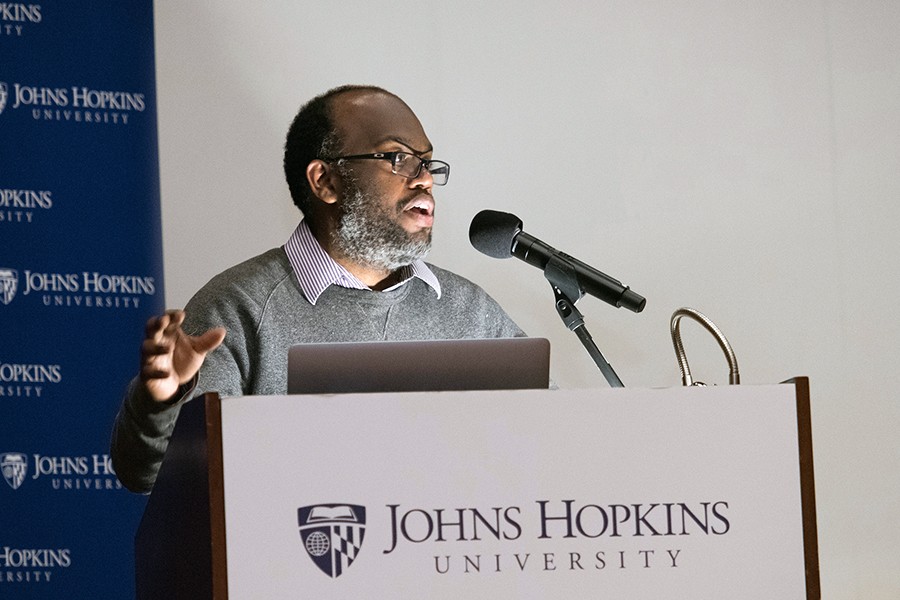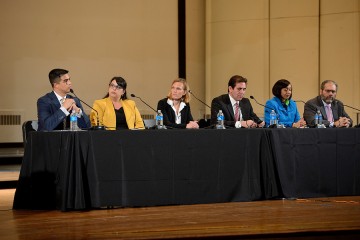As a junior in high school contemplating his future more than a decade ago, Dan-el Padilla Peralta began sneaking off to read any article he could find about immigration.
Though he was excelling at his private school in Manhattan, he had started to sense that his own status as an undocumented immigrant from the Dominican Republic could slam the door on every ambition he was nurturing.
The articles he read, describing efforts to rid the U.S. of illegal immigrants, were not encouraging.
"'Get out,' I heard the laws shout at me," Padilla said Wednesday night in a talk at Johns Hopkins University.
Padilla's 2015 memoir, Undocumented: A Dominican Boy's Odyssey From a Homeless Shelter to the Ivy League, chronicles his path to becoming a classics professor at Princeton University—a journey he described in his talk as one marked by "fortuitous interventions" that do not befall many illegal immigrants, then or today.
"So much of what accounts for the ability of some people to 'make it out' rides purely on luck," he said, arguing that these opportunities should instead be the "right and outcome of every single American."
One pivotal "intervention" came for Padilla when he was in fourth grade, living in a Brooklyn shelter. A volunteer art teacher took note of the intellectually curious boy and became a mentor, helping guide Padilla toward admission at an elite private school.
Padilla's family originally came to New York from Santo Domingo in 1989, as his mother sought prenatal care for the birth of his younger brother. His father, dejected from the endless instability of life as someone in the country illegally, later returned to the Dominican Republic. The rest of the family remained, jumping from address to address and winding up in the shelter system.
In high school, Padilla confronted his own "psycho-emotional rut" over his undocumented status. But he found help from guidance counselors and admissions officers who told him—sometimes with false confidence, he now realizes—that his status shouldn't hinder his goals.
He made it into Princeton as an undergraduate, choosing to "come out" as an undocumented immigrant during his senior year via a Wall Street Journal article that shared his story.
As Padilla made his way to Oxford and Stanford, then back to Princeton as a professor, lawyers helped him attempt various legal maneuvers for gaining documentation. None succeeded. Ultimately he found his way to citizenship through his marriage in 2015.
One prescient detail of Padilla's memoir—written before the current immigration controversies of the presidency of Donald Trump—is a quote on its first page: "Fundamentally, almost no one coming from the Dominican Republic to the United States is coming here because they have a provable skill that would benefit us and that would indicate their likely success in our society."
The statement came from then-Alabama Sen. Jeff Sessions, who is now Trump's attorney general.
In his talk at Hopkins, Padilla said he's thought about adding a new epilogue to his book that explores the new realities for illegal immigrants. Of Trump, he said he has tried to find empathy for the suffering of some "systematically oppressed" Americans that contributed to the president's rise, but he argued that broader social justice movements must continue.
"How do you do honor to the suffering of all of these groups without setting up a hierarchy that gives groups primary preference to another?" he asked.
Padilla called for universities to make use of the experiences of those "who have been on the violent end of oppression."
These people "have so much to teach us about what it means to be human, what it is to be humane," he said. "We need these people in our classrooms, teaching our students."
Padilla's visit marked the inaugural Richard A. Macksey Lecture, presented by the Alexander Grass Humanities Institute, in conjunction with the Department of Classics; the JHU Forums on Race in America; the Foreign Affairs Symposium; and the Racism, Immigration and Citizenship Program.
Posted in Arts+Culture, Voices+Opinion, Politics+Society
Tagged immigration









